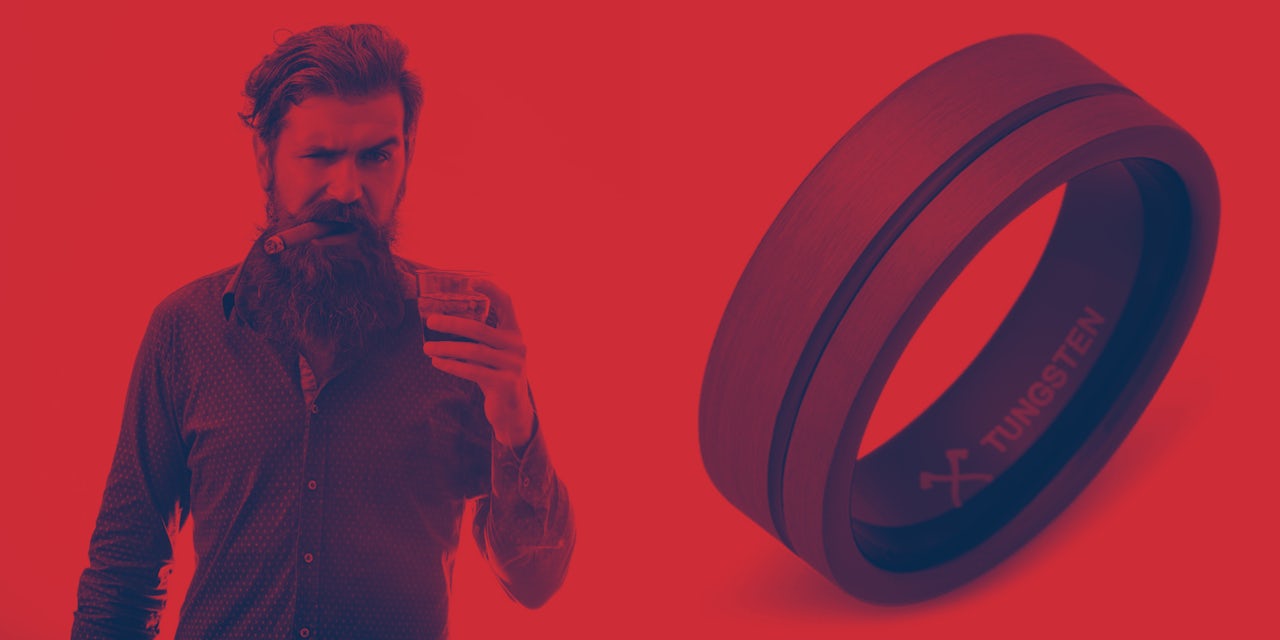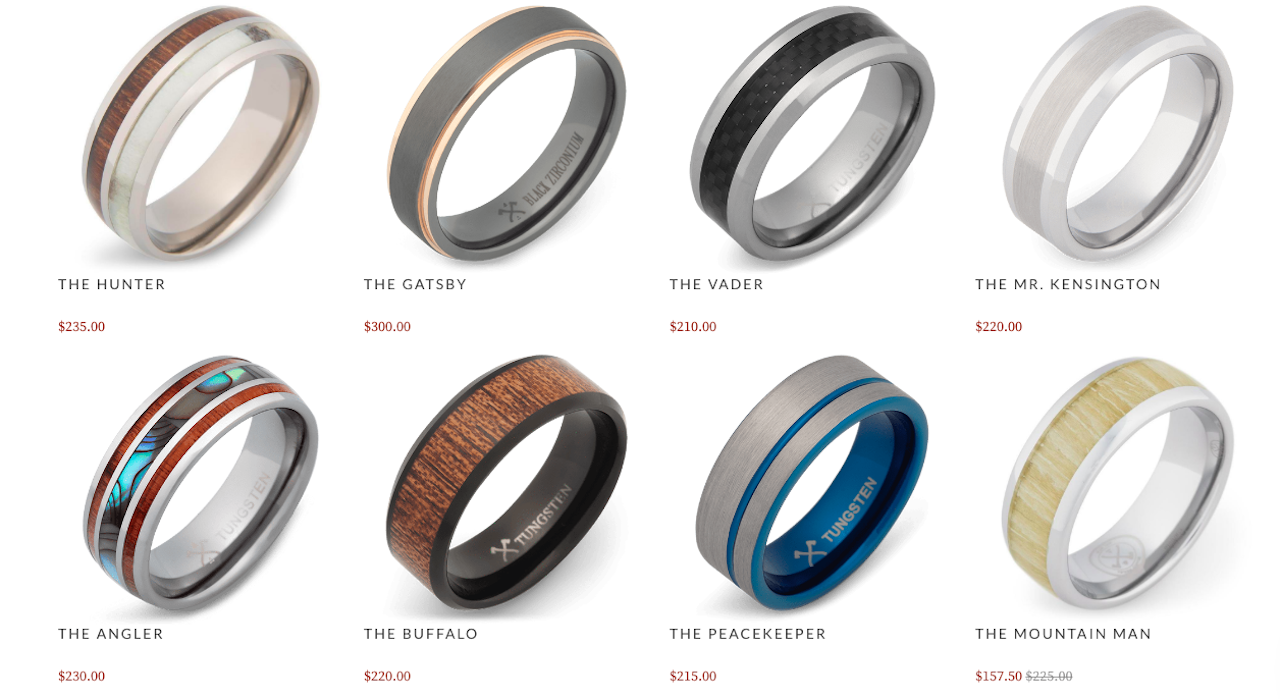I recently bought my own wedding ring, which was a good opportunity to go to the mall, grab a smoothie, and think about how happy my father seemed in the months after he got divorced. He had worn a plain gold band my whole life, and I remember, after he moved out of the house where I grew up and into our neighbor’s basement, how bare his hand looked as he gestured to describe some funny thing his roommate said while they were eating soup in front of the TV. The other wedding ring I clearly recall belonged to my old boss. It was black and made of some anodized metal, and he could open a beer bottle with it, which I thought was extremely cool. I remember resolving to learn how to do that, but then two decades passed, and a lot of things that had impressed me as a young man lost their appeal.
Going to the jewelry store at age 41 was like going to the club, in that I felt compelled to explain myself to people who didn’t ask. I mentioned to the saleswoman, casually but also before I mentioned size or materials, that I was marrying for the first time. I wanted her to know that I was one of the good ones, and that although the subset of aging bachelors who married and adopted children after a lifetime of responsible but ultimately selfish drug use was statistically small, I was nonetheless routinely attending school events with an 11 year-old boy who sometimes called me “Dad” instead of “Dan.” That’s why I was at Kay Jewelers alone and so old.
You can’t burden strangers with that kind of biography, though, so instead I fled the jeweler to eat feta fries at the Greek place and look at rings on my phone. I mention this because I want to make two things clear. One, I am not having an identity crisis. Two, in the midst of my admittedly massive identity opportunity, the Internet was there to offer me this antler sand-blasted titanium gunmetal wedding band. It forced me to ask myself: Could I be an antler sand-blasted titanium gunmetal type of guy?
Johnathan Ruggiero is the CEO of ManlyBands.com, an internet-based jeweler that specializes in men’s wedding rings. Manly Bands is headquartered in Park City, Utah, where Ruggiero lives with his wife and a condition he calls “sausage fingers.” As he described it to me, the experience of buying his own wedding band was humiliating.
“I’d never worn jewelry in my life,” he told me. “[The jeweler] pulled out the sizer, and he didn’t even have one that would fit me. I wound up feeling really bad about myself.” Ruggiero eventually found an online supplier that would ship him a plain gold band he thought would fit. It turned out to be about a half size too large and arrived loose in a manilla envelope. Opening it was not the occasion he had envisioned.
“Guys should be able to buy a ring that they want and get excited about it,” he said. “My ring was like this piece of crap from the internet.”
Ruggiero bought his piece of crap from the internet in 2016, the same year he and his wife Michelle got married, left Los Angeles, and started Manly Bands together. They now sell more than 3,000 rings a month. Neither had worked in jewelry before — in LA, John worked for Getty Images and Michelle was an actress — but they were so disappointed with John’s experience that they believed they could do better. John didn’t like his ring because it didn’t feel special; anyone with sausage enough fingers could have worn it. This feeling — that our purchases too often make us more like others, when they ought to make us more ourselves — drives the market for nontraditional men’s wedding bands.
One of the most striking features of that market is that gold is over. You can still get it, of course, but you can also get rings made of carbon fiber and stainless steel, rings carved from antlers and cask wood, even rings made from materials recovered from meteorites. There are rings specifically designed for opening beer bottles, so everyone can be as resourceful/pathological as my old boss. Manly Bands even sells a ring inlaid with fragments of dinosaur bones.
This product is a testament to the power of the internet to satisfy previously undiscovered needs. In any one town, the demand for men’s dinosaur-bone wedding bands is too small for a physical shop to make them profitably. A digital market, on the other hand, gathers enough men who want a wedding ring made from antlers, titanium, and whiskey barrel wood that it becomes worthwhile to make such a thing. This phenomenon is sometimes called the long tail, by which the internet has made it viable to market and distribute niche products that reflect buyers’ particular interests or tastes.
The corollary to the long tail is that the 21st century furnishes us with many, many more opportunities to express our identities by buying things. In an economy that produces only one type of automobile or shirt or men’s wedding band, your car and clothes and ring don’t say much about you. As such products become more personalized, however, purchases that were once functional become existential. To buy a ring in this market is to declare not only your intention to get married, but also your core identity.
Say you are into hunting. Where I live, in Montana, camouflage is a socio-economic signifier roughly on par with what Burberry plaid was in the early 2000s. Manly Bands has partnered with the hunting outfitters RealTree, King’s Camo, and Mossy Oak to produce a line of rings in “the most badass camos.” I don’t hunt, but I briefly considered buying a camouflage ring, partly to signal my deep commitment to irony and partly to get better service at the auto parts store.
A similar thought process influenced my decision not to buy The Peacekeeper, a tungsten-carbide band with a thin blue line running through it. A ring that invites the wearer to bring his law-enforcement identity into marriage, The Peacekeeper shares its name with a gun in the Call of Duty video game series and just misses the old-West term for the Colt revolver. I’m not a cop, but I considered that maybe if I wore a cop-themed wedding band and got pulled over they would go easy on me, like when you put a Police Athletic League sticker on your car. I ultimately discarded this plan, on the grounds that it was my only ring-related idea that could get me shot dozens of times.
The badasses of our collective fantasies are invariably single. ... As my own wedding approaches, I worry I will never become the murderous vigilante I always assumed I was.
If our theory of the long-tail ring economy is correct, then The Peacekeeper exists to serve a market of grooms who want to assert their identities as badass cops, presumably because the act of getting married has thrown that identity into crisis. It’s also possible that they consider any kind of jewelry, including a wedding ring, affected or feminizing in a way that is incompatible with masculine authority. This raises an uncomfortable question: Is getting married a not-badass thing to do?
Back when middle-class male gender identity implied the exclusive ability to provide for a family (A.D. 1585 — the first season of Laverne and Shirley), getting married was arguably badass, in the sense that it called on the man to perform strongly gendered behaviors. Over the last several decades, however, workplace parity and other progressions toward gender equality have reduced the number of activities that are conspicuously masculine. At my kid’s school, I saw another dad wearing a hoodie that read “I’m a VETERAN and an ASSHOLE, so if you don’t want your feelings hurt, WALK AWAY.” Disregarding the wave of other signifiers it brought crashing over meet-the-teacher night, this garment identified two things that remain unequivocally male: violence and not caring about other people’s feelings. Both are antithetical to marriage.
The badasses of our collective fantasies are invariably single. Dirty Harry never goes home to his wife, and John Wick, who retired from killing when he got married, returns to badassery only after the last vestiges of his domestic life have been destroyed. Even the protagonist of Death Wish starts by losing his family. As my own wedding approaches, I worry I will never become the murderous vigilante I always assumed I was.
I mulled this possibility for several weeks and did nothing, as is my praxis. After my fiancée suggested, gently, that the most important aspect of the decision could be timeliness, I returned to the mall. There I bought a plain gold band of the type you might include in a married-man disguise kit. I am not the kind of guy who needs a ring made of tungsten and antlers to stay butch, I thought — but it doesn’t take Adorno to see the contradiction. In the context of all these manly options, my plain band has also become a symbol. It defies the late capitalist economy and expresses my contempt for where other men are headed. A generation ago, it would only have said that someone agreed to marry me. In 2019, as we inch closer to that perfect economy where everything we buy explains exactly who we are, my ring says we can name the beast but never escape it.

